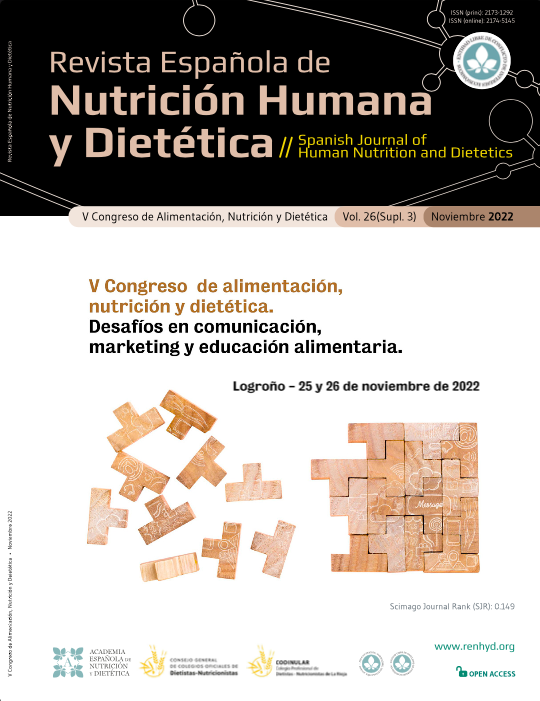La optimización de la dieta individual en adultos franceses muestra que las alternativas vegetales a los lácteos pueden complementar los lácteos en dietas sostenibles
Keywords:
-References
(1) Springmann M, Clark M, Mason-D’Croz D, Wiebe K, Leon Bodirsky B, Lassaletta L, de Vries W, Vermeulen SJ, Herrero M, Carlson KM, et al. Options for keeping the food system within environmental limits. Nature. 2018; 562: 519-25.
(2) Willett W, Rockström J, Loken B, Springmann M, Lang T, Vermeulen S, Garnett T, Tilman D, DeClerk F, Woos A, et al. Food in the Anthropocene: The EAT–Lancet Commission on healthy diets from sustainable food systems. Lancet. 2019; 393: 447-92.
(3) Vermeulen SJ, Campbell BM, Ingram JSI. Climate change and food systems. Annu Rev. 2012; 37: 195-222.
(4) GBD 2017 Diet Collaborators. Health effects of dietary risks in 195 countries, 1990–2017: A systematic analysis for the Global Burden of Disease Study. Lancet. 2019; 393: 1958-72.
(5) Steffen W, Richardson K, Rockstrom J, Cornell SE, Fetzer I, Bennett EM, Biggs R, Carpenter SR, de Vries W, de Wit CA, et al. Planetary boundaries: Guiding human development on a changing planet. Science. 2015; 347: 1259855. https://doi.org/10.1126/science.1259855.
(6) Garnett, T. Food Climate Research Network. Changing What We Eat: A Call for Research & Action on Widespread Adoption of Sustainable Healthy Eating; Food Climate Research Network: Oxford, UK, 2014.
(7) Burlingame BA, Dernini S. Nutrition and Consumer Protection Division FAO Sustainable diets and biodiversity: Directions and solutions for policy, research and action. In Proceedings of the International Scientific Symposium on Biodiversity and Sustainable Diets: United against Hunger, Rome, Italy, 3–5November 2010; FAO: Rome, Italy, 2012.
(8) AFSSA. Etude Individuelle Nationale des Consommations Alimentaires 2 (INCA2). 2006–2007. AFSSA: Maisons-Alfort, France, 2009.
(9) Gazan R, Brouzes CMC, Vieux F, Maillot M, Lluch A, Darmon N. Mathematical optimization to Explore Tomorrow’s Sustainable Diets: A Narrative Review. Adv Nutr. 2018; 9: 602-16. https://doi.org/10.1093/advances/nmy049.
(10) FAO; WHO. Sustainable Healthy Diets - Guiding Principles; FAO: Rome, Italy; WHO: Rome, Italy, 2019.
(11) EUPHA. Healthy and Sustainable Diets for European Countries; EUPHA: Lueneburg, Germany, 2017.
(12) Barré T, Perignon M, Gazan R, Vieux F, Micard V, Amiot MJ, Darmon N. Integrating nutrient bioavailability and co-production links when identifying sustainable diets: How low should we reduce meat consumption? PLoS ONE 2018; 13: e0191767. https://doi.org/10.1371/journal.pone.0191767.
(13) Perignon M, Masset G, Ferrari G, Barré T, Vieux F, Maillot M, Amiot MJ, Darmon N. How low can dietary greenhouse gas emissions be reduced without impairing nutritional adequacy, affordability and acceptability of the diet? A modelling study to guide sustainable food choices. Public Health Nutr. 2016; 19: 2662-74. https://doi.org/10.1017/S1368980016000653.
(14) Vieux F, Perignon M, Gazan R, Darmon N. Dietary changes needed to improve diet sustainability: Are they similar across Europe? Eur J Clin Nutr. 2018; 72: 951-60. https://doi.org/10.1038/s41430-017-0080-z.
(15) Broekema R, Tyszler M, van’t Veer P, Kok FJ, Martin A, Lluch A, Blonk, HTJ. Future-proof and sustainable healthy diets based on current eating patterns in the Netherlands. Am J Clin Nutr. 2020; 112: 1338-47. https://doi.org/10.1093/ajcn/nqaa217.
(16) HCSP. Statement Related to the Revision of the 2017–2021 French Nutrition and Health Programme’s Dietary Guidelines for Adults; HCSP: Paris, France, 2017.
Downloads
Published
How to Cite
Issue
Section
License
Copyright (c) 2022 Rozenn Gazan, Florent Vieux, Anne Lluch, Stephanie de Vriese, Beatrice Trotin, Nicole Darmon

This work is licensed under a Creative Commons Attribution-NonCommercial-ShareAlike 4.0 International License.











